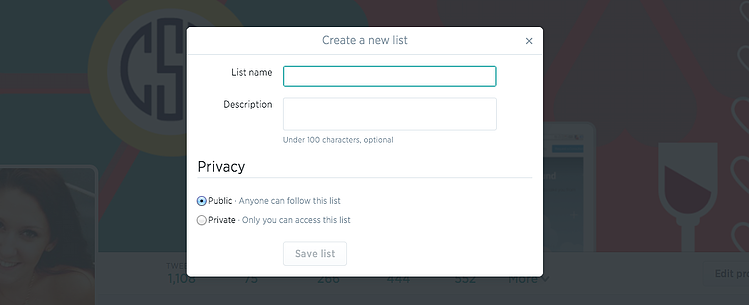Subscribe now and get the latest podcast releases delivered straight to your inbox.
 I don't know about you, but I love making lists.
I don't know about you, but I love making lists.
Whether it's a grocery list in the notes app on my phone, a blog topic list on Trello, or a to-do list on a sticky note, sometimes it helps to separate your thoughts from the noise and visualize them.
I'll be the first to admit that my Twitter feed, like my brain, gets a little noisy at times too.
The solution?
Enter Twitter lists.
Essentially Twitter lists provide your business with the ability to separate specified groups of users from your noisy stream, making it easier to monitor and engage.
Below we've detailed a step-by-step tutorial to help you get started with Twitter lists for your business, as well as a few suggestions on how to use them to improve your social engagements.
How to create a Twitter list:
Sign into Twitter and click the 'Me' tab at the top of the screen to view your profile. Select the 'More' option next to 'Favorites' and select 'Lists':

Select 'Create New List' on the right side of the screen.

Name the list, create a description, and adjust the privacy settings accordingly.

Once the list is created, search by username, first/last name, or business/brand to add people.

How to leverage Twitter lists:
Monitor the competition
When are they tweeting? Determining the time frame and frequency in which your competitors are tweeting is great insight to have.
If you notice that they're tweeting later into the evening than you are, look into the engagement they're getting at those times. If their late night tweets are performing really well, perhaps it would be beneficial for your business to adjust the frequency of your posts.
Keep in mind that this doesn't mean staying up all night to post content. A social media publishing tool like HubSpot's or HootSuite's makes it easy to craft compelling messages and schedule them for a later date.
Aside from frequency, check out how your competitor's are handling customer service. Are they responding to questions and comments?
If they're leaving questions unanswered, they're leaving opportunities on the table for you to take advantage of.
Stay in-tune with industry influencers
Looking for interesting, relevant content to share with your audience? Creating a list of industry influencer is a great way to stay on top of the latest trends and changes going on in your industry.
Not only does this list serves as the perfect reference when you're looking for inspiration, but it also serves as a way to easily pull the people who you should be engaging with into the forefront.
When you share and engage with their content, you're effectively getting your business on their radar. Once they know you're there, it's easier to initiate a connect which could lead to valuable co-marketing opportunities.
Initiate and maintain customer relationships
Creating a list of your customers, both existing and potential, is a great way to initiate and maintain customer relationships.
With a segmented list of these people in your tool belt, it's easy for your business to check in and monitor conversations surrounding your product or service.
When you see a question arise, answer it. If you happen upon a complaint, resolve it. If they're looking for clarification, provide a resource.
Participate in event-based conversations
Last year, HubSpot created a public Twitter list for their INBOUND 2013 attendees. Users who followed the list were able to easily filter through the noise in their feed and extract just the conversations going on about the conference.
This made it simple for attendees to exchange thoughts and ideas, network, and stay in tune with anything they missed.
If you're hosting or attending an event, consider creating an event-specific Twitter list in order to keep up in a similar fashion.


Order Your Copy of Marcus Sheridan's New Book — Endless Customers!

